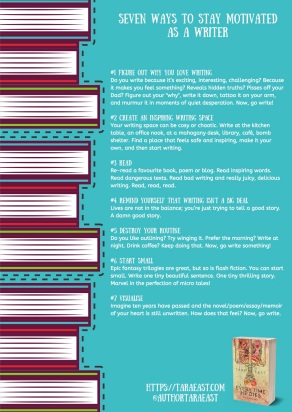Recently, I was checking the analytics on my YouTube Channel and noticed that a short video I posted over a year ago called Heinlein’s Five Rules for Writing was the most watched video on my channel.
So, I took the hint and for the next four weeks I am going to be covering the ‘writing rules’ of four famous authors. Last week, I discussed Octavia Butler and her Nine Rules of Writing and this week I’m unpacking Natalie Goldberg’s Seven Rules of Writing which appeared in her craft book Wild Mind: Living the Writer’s Life.
Before we dive into today’s video, I want to acknowledge that for many of us, writing may not be the biggest priority right now. We’re all dealing with a slew of other concerns as we’ve had to adjust to working from home, changes in our financial situations, and the general restrictions we’ve been adhering to as part of the pandemic.
In many places, these restrictions are starting to lift and while it may be some time until things get back to normal, I wanted to put this series together as a way to inspire and support you during this time.
Natalie Goldberg is an American author of fiction, non-fiction, and poetry, but she is most  famous of her books that explore writing as Zen practise.
famous of her books that explore writing as Zen practise.
While many craft based book focus on the nuts and bolts of writing – character, dialogue, plot, theme – Goldberg’s book focus on the emotional rewards of writing, as well as how to develop a writing practise. Goldberg’s methodology is skewed towards journal writing, but the advice presented in her books can easily be applied to all forms, whether it be fiction, poetry, or memoir.
The following quote sums up Goldberg’s writing philosophy perfectly:
“I don’t think everyone wants to create the great American novel, but we all have a dream of telling our stories-of realizing what we think, feel, and see before we die. Writing is a path to meet ourselves and become intimate.”
Now, I do want to preface this blog by saying that there aren’t any real rules for writing other than the ones you decided for yourself. I’m making this series as a means of inspiration and education so that you can take the advice that appeals to you, and leaving the rest.
So, let’s get to it.
Rule #1: Keep your hand moving
This is perhaps Goldberg’s most famous rule. Keep your hand moving is a challenge to your will power and determination. It is also the best way to separate the editor from the creator. By keeping your hand moving, you are less likely to stop, ruminate over what you wrote, and give into the false temptation of perfectionism. It is easy to waste an hour of writing time fiddling with a paragraph or a single sentence.
There is a time for revising, and an hour spent polishing a paragraph is an hour well spent when you are in the revising stage of your novel. However, you do not need to be wearing your editing hat if you are creating a first draft, if you are new to writing, or if you are simply trying to make writing a habit.
Writing wins when you keeping your hand moving.
Rule #2: Lose Control
We self-censor our work all the time. Why? Because writing is a vulnerable act. If you are writing memoir, this is doubly so because you are sharing personal details and stories from your own lived experience.
Writing fiction is its own sticky net. Sometimes people mistakenly think that our work is memoir in fancy dress and that our characters are mouth-pieces for our own thoughts and beliefs. Sometimes, writing fiction is shameful because we fear that what we have written isn’t very good.
There are so many ways that we judge our work and censor ourselves during creating practise.
We cringe at the idea of our grandmother reading the sex scene in chapter seven, or that our friends will assume that’s what we’re in too!
When you are writing a first draft, or when you are writing for practise (exercises, journaling), it’s important that you loosen up. No one is going to read your work and judge you unless you let them.
Let the words be ripped out of you, raw, and covered in gore.
If you want to write something that feels alive, then you need to write honestly, without censorship.

Rule #3: Be specific
This rule relates to writing craft on the line level. It is the details that transform words on a page into images in the reader’s mind. So, when you’re writing, it’s important that you pay attention to the nouns, verbs, colours, and texture, that create your descriptions.
Not every sentence has to be filled with original prose and breath taking beauty – some sentences are just there to move the story forward – but if you’re practising the art of ‘keeping your hand moving’ and notice that one sentence seem a bit … vanilla … push yourself to be more specific in the next sentence.
Focussing on sensory details or embedding imaginative metaphors and similes are just some of the ways you can become more specific in your descriptions.
Rule #4: Don’t think
If you’re keeping your hand moving, then there really isn’t that much time to think anyway, but Goldberg makes a strong argument for following your “first thought” when writing.
For Goldberg, this rule, specifically, is tied to her Zen practise: by following her first thought, she supports rules two and three, because she is forced to stay in the present moment. By staying present, she is better able to avoid self-censorship, keep her inner editor at bay, and to really let loose with her writing.
Personally, I believe that “don’t think” is a good practise for writers like myself who need to get down a crappy first draft before they can move forward.
The ideas that appear in a first draft won’t be the best, but by getting down the bones of the story we can begin the slow process of building that skeleton up into a completed book.

Rule #5: Don’t worry about spelling, punctuation or grammar
This is another way to stay present with the work in the moment. Spelling, punctuation, and grammar are duties that belong to the editor and your editor does not need to be in the room while you are drafting or journaling or brainstorming.
The editor operates out of the left side of brain. She is analytical, literal, and thinks linearly. Exploratory writing needs the qualities of the right side, creative, imaginative, non-linear.
Spelling, punctuation, and grammar are important, but they are not the building blocks you need to concern yourself with if you are drafting or simply trying to developing a writing habit.
Rule #6: You are free to write the worst junk in the world
You don’t have to publish it, but you’re free to write it.
The more you write, the bigger your body of work will become. The more you write, the better your writing will become.
But, of course, not everything you write will be good, even if your writing as a whole improves. Stephen King has written 70+ books and The Tommyknockers is definitely not of the same calibre as The Shinning, The Stand, It, 11/22/63 … you get the picture.
Write bad stuff, write good stuff, just write.

Rule #7: Go for the jugular
If something uncomfortable, controversial, painful, wild, or surprising pops up while you’re writing, don’t stop! Keep your hand moving, continue with the thought and write it all out. As Hemingway said, “Write hard and clear about what hurts.”
Remember, you don’t have to publish what you’ve written and you can always edit your work later, but it’s important that you give yourself permission for the writing to be messy, undulating, and alive.
You may end your writing session, look back on your work and see nothing but chaos, but as long as there is a beating heart nestled within that story, then you have done your job and it’s up to your inner-editor to plug that heart into the body of your story.
GRAB A FREE COPY OF SEVEN WAYS TO STAY MOTIVATED AS A WRITER

While you’re here, be sure to join my email newsletter and gain instant access to your FREE downloadable copy of the Seven Ways to Stay Motivated as a Writer. Plus, you’ll receive my weekly newsletter straight to your inbox every Thursday morning. This is where I share links to my latest blog/vlog, updates and other exclusive content that I ONLY share via email.


Great advice! Thanks for posting!
LikeLike
So glad you enjoyed the post. Thanks for commenting, Benn. 🙂
LikeLike
I found this very helpful. Thank you!
LikeLike
That’s great, thank you, Kymber.
LikeLiked by 1 person
[…] rules’ of four famous authors. Firstly, I covered Octavia Butler’s nine rules of writing, then Natalie Goldberg’s seven rules of writing, and this week I’m focussing on Kurt Vonnegut’s eight […]
LikeLike
[…] writing rules. I started off this series with Octavia Butler’s nine rules of writing, followed by Natalie Goldberg’s seven rules of writing, and last week I unpacked Kurt Vonnegut’s eight rules of fiction […]
LikeLike
[…] rules. I started off this series with Octavia Butler’s nine rules of writing, followed by Natalie Goldberg’s seven rules of writing, then Kurt Vonnegut’s eight rules of fiction writing, and two weeks ago I unpacked Steven […]
LikeLike
Wonderful advice. I love reading about writing!
LikeLike
Me too! Almost as much as I like writing 🙂
LikeLiked by 1 person